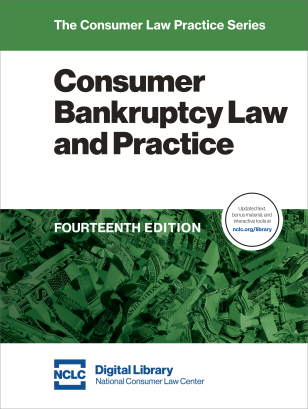The Supreme Court in Ritzen Group, Inc. v. Jackson Masonry, L.L.C., 2020 WL 201023 (U.S. Jan. 14, 2020) just ruled that creditors wanting to appeal a bankruptcy court’s denial of relief from the automatic stay must do so within fourteen days. This provides new ammunition for a debtor who files bankruptcy to put off a creditor’s foreclosure, collection lawsuit, wage garnishment, or bank account or other property seizure, if a creditor fails to timely appeal denial of stay relief.
Filing a bankruptcy triggers an automatic stay of most creditor actions against the debtor. While the creditor can seek relief from this stay, the Supreme Court just ruled that the bankruptcy court’s decision on this motion is a final, appealable order, meaning that if the creditor or debtor wishes to appeal that determination, it has the right to appeal that decision immediately but also must do so within fourteen days. See Bankruptcy Rule 8002(a). See also National Consumer Law Center, Consumer Bankruptcy Law and Practice § 14.8.4 (12th ed. 2020), updated at www.nclc.org/library.
Background to the Supreme Court’s Ruling
An issue frequently litigated in bankruptcy appeals is whether the appeal has been taken from a final order. If the order is not final, any appeal must await a final order. If the order is final, then any appeal must be within fourteen days. Whether various types of bankruptcy orders are final has produced conflicting opinions in the circuit courts, in part because there is no Bankruptcy Code or other statutory provision that addresses what is or is not a final order, judgment, or decree. Moreover, a bankruptcy case often involves a variety of separate proceedings, each resulting in potentially separate, appealable orders. See National Consumer Law Center, Consumer Bankruptcy Law and Practice § 14.8.4 (12th ed. 2020), updated at www.nclc.org/library.
In 2015, the Supreme Court in Bullard v. Blue Hills Bank, 575 U.S. 496 (2015), ruled that an order denying confirmation of chapter 13 plan, but not dismissing the case, is not appealable. In contrast to that decision, a unanimous Supreme Court in Ritzen has now held that determinations granting or denying relief from the automatic stay are final decisions that are immediately appealable, so that any appeal must be within fourteen days.
The Facts in Ritzen
Ritzen Group was bringing a state court collection action against Jackson Masonry. Jackson Masonry filed a chapter 11 bankruptcy case on the eve of trial, triggering the automatic stay. Ritzen filed a motion for relief from the automatic stay, seeking permission to resume its state court collection litigation. The bankruptcy court denied the stay relief motion and Ritzen did not appeal the decision within fourteen days. Instead, Ritzen filed a proof of claim for the amount it was seeking in the state court collection case. As a judgment in an adversary proceeding, the bankruptcy court disallowed this claim.
Ritzen then filed two separate notices of appeal—for denial of stay relief and for disallowance of its claim. On appeal to the district court and then to the Sixth Circuit Court of Appeals, both held—as relating to the appeal of the stay relief—that the denial of stay relief was a final order, and that the appeal well beyond fourteen days of that order was not timely.
The Supreme Court’s Ruling in Ritzen
The Supreme Court in Ritzen agreed. It held that an order resolving a stay relief motion is entered in a “discrete” proceeding within the bankruptcy case and is therefore immediately appealable. Relying upon its earlier decision in Bullard v. Blue Hills Bank, the Court noted that the “bankruptcy court’s order ruling on a stay-relief motion disposes of a procedural unit anterior to, and separate from, claim-resolution proceedings.” Ritzen, 2020 WL 201023, at *5.
Ritzen argued that the stay relief proceeding was simply the first step in the claim adjudication process, because it resolved only the court (bankruptcy or state) that would adjudicate the merits of its contract claim. The Court disagreed. While a stay relief motion may determine where a claim is adjudicated, that “effect does not render a ruling nonfinal.” Ritzen, 2020 WL 201023, at *6.
Moreover, the Court noted that many stay relief proceedings do not involve claim adjudication or efforts to pursue claims in a non-bankruptcy forum, as often creditors may seek relief to pursue nonjudicial foreclosure, debt set-off, or lease termination. The Court further noted that this point was raised by the National Association of Consumer Bankruptcy Attorneys in its amicus brief.
Footnote in Court’s Ritzen Decision Muddies the Waters
Ritzen leaves no doubt that stay relief determinations are final decisions, but a footnote in the opinion creates some uncertainty about orders entered without prejudice. The footnote states that the Court is not deciding “whether finality would attach to an order denying stay relief if the bankruptcy court enters it ‘without prejudice’ because further developments might change the stay calculus.” Ritzen, 2020 WL 201023, at *7, n.4.
Prior to Ritzen, it was unusual for orders denying stay relief to state whether they were with or without prejudice. Such orders generally have been viewed as being without prejudice, even if that is not expressly stated in the order, as changed circumstances often warrant renewal of the motion. For example, if a court denies stay relief because it finds that there is a sufficient equity cushion in the property, the secured creditor could be expected to renew the motion if the amount of equity declines since the original motion was filed.
As a result of the Ritzen footnote, courts may be more likely to designate their orders as being with or without prejudice. It also can be expected that a creditor who wishes to pursue an immediate appeal of a stay relief denial will request that the order be entered with prejudice.
Are Conditional Relief from Stay Orders Final and Appealable?
The Ritzen footnote about denial without prejudice will lead to questions about the finality of an order that only conditionally denies or modifies the stay, such as a “drop-dead” order that grants or denies stay relief if the debtor takes certain actions within a specified time period. See, e.g., Matter of Mendoza, 111 F.3d 1264 (5th Cir. 1997) (bankruptcy court has authority to include a “drop dead” clause in its order conditionally modifying stay).
These orders typically provide that the secured creditor may enforce its security interest without further court hearing upon submission of evidence, such as a declaration from the creditor that the debtor has defaulted in making required payments. See, e.g., In re Hughes, 2010 WL 7351804 (Bankr. E.D. Va. Feb. 25, 2010). Similar to orders entered without prejudice in which future developments could “change the stay calculus,” it may be argued that this type of conditional order is interlocutory. However, the issue of their appealability it not likely to arise since most of these orders are consensual. And, at least with respect to non-consensual conditional orders that deny stay relief, courts will probably find them to be final orders.
Other Bankruptcy News: New Subpart V to Bankruptcy Code Chapter 11 Effective February 20
The Small Business Reorganization Act of 2019, Pub. Law No. 116-54 (Aug. 23, 2019), effective Feb. 20, 2020, adds new subpart V to Bankruptcy Code chapter 11 (11 U.S.C. §§ 1181–1195). The new amendment provides a qualifying small business debtor, whether an individual or business entity, with the option to proceed either under new subchapter V or use the pre-2020 chapter 11 small business procedures that remain in effect.
A qualified small business debtor is one with non-contingent liquidated secured and unsecured debts aggregating less than $2,725,625. In addition, at least 50% of the indebtedness must have arisen from the debtor’s commercial or business activities. A debtor that operates a single-asset real estate business is not eligible to proceed under the small business bankruptcy options.
Generally, subchapter V makes the process of plan confirmation and discharge simpler for the debtor than under existing law. This is particularly true for cases in which all classes of creditors consent to the plan’s treatment of their claims.
Effective February 20, 2020, a number of official bankruptcy forms have been revised to reflect the new subpart V provisions: Official Forms 101, 201, 309E1, 309E2, 309F1, 309F2, 314, 315 and 425A. Also amended is Director’s Form 2000. See the new forms at the website for the Administration Office of the U.S. Courts. Also available on that website are interim bankruptcy rule changes required by the subpart V amendments to rules 1007, 1020, 2009, 2012, 2015, 3010, 3011, 3014, 3015, 3017.1, 3017.2 (new), 3018, and 3019.
If a debtor files under chapter 11, subpart V, a consumer as a creditor in that bankruptcy has an additional right not provided for in other chapter 11 bankruptcies. Where the court confirms the debtor’s plan under the non-consensual (cram-down) provisions of new Code § 1191(b), the discharge will be subject to the exceptions found in Code § 523(a). See new Code § 1192. These limits on the discharge apply to both individual and business entity debtors.
Subchapter V thus creates the only instance where a consumer creditor may potentially challenge a corporation’s discharge of a debt on grounds such as fraud or willful and malicious injury. However, this option is tempered by the requirement that the lack of consent to the plan must come from a class of creditors and not an individual creditor.


